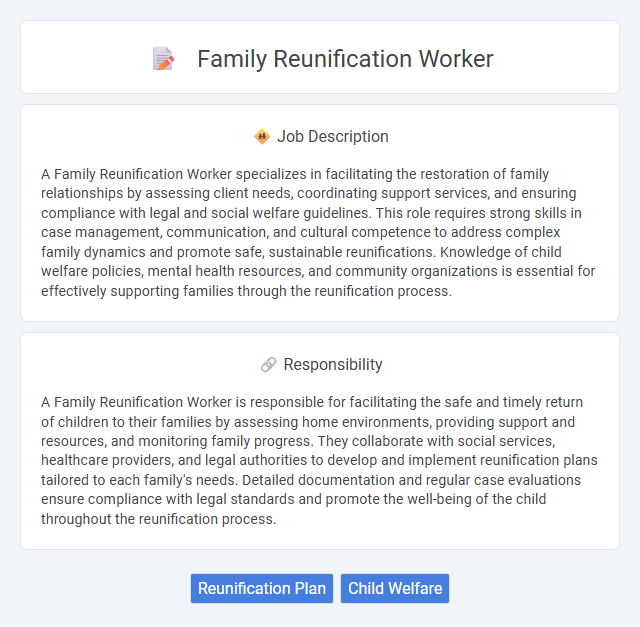
A Family Reunification Worker specializes in facilitating the restoration of family relationships by assessing client needs, coordinating support services, and ensuring compliance with legal and social welfare guidelines. This role requires strong skills in case management, communication, and cultural competence to address complex family dynamics and promote safe, sustainable reunifications. Knowledge of child welfare policies, mental health resources, and community organizations is essential for effectively supporting families through the reunification process.
People with strong empathy and excellent communication skills are likely suitable for a family reunification worker job, as it involves supporting individuals experiencing emotional and legal challenges. Those who can handle stressful situations with patience and maintain confidentiality may have a higher probability of success. Candidates lacking emotional resilience or interpersonal skills might find this role less suitable.
Qualification
A Family Reunification Worker requires a bachelor's degree in social work, psychology, or a related field, often complemented by relevant certification or licensure. Strong knowledge of child welfare laws, family dynamics, and counseling techniques is essential for effective case management and client support. Experience in crisis intervention, cultural competency, and documentation skills enhances the ability to facilitate successful family reunifications.
Responsibility
A Family Reunification Worker is responsible for facilitating the safe and timely return of children to their families by assessing home environments, providing support and resources, and monitoring family progress. They collaborate with social services, healthcare providers, and legal authorities to develop and implement reunification plans tailored to each family's needs. Detailed documentation and regular case evaluations ensure compliance with legal standards and promote the well-being of the child throughout the reunification process.
Benefit
Family reunification workers likely facilitate the reconnection of separated family members, which can improve emotional well-being and social stability for individuals involved. Their role may reduce the psychological stress and anxiety associated with family separation, enhancing overall mental health. Employment in this field frequently offers a sense of personal fulfillment through meaningful contributions to family cohesion and community support.
Challenge
Family reunification workers likely face significant challenges navigating complex legal systems and varying immigration policies, which can complicate efforts to unite families. High emotional stress is probable due to working with vulnerable populations experiencing trauma and uncertainty. Balancing case management with empathy may demand strong resilience and interpersonal skills to effectively support clients through difficult reunification processes.
Career Advancement
Family reunification workers play a crucial role in facilitating the safe return of separated family members, often working within social services or immigration sectors. Career advancement opportunities include moving into supervisory roles, specializing in trauma-informed care, or transitioning into policy development and advocacy positions. Gaining certifications in social work or counseling can significantly enhance prospects for leadership roles and higher-level case management.
Key Terms
Reunification Plan
A Family Reunification Worker develops and implements a comprehensive Reunification Plan tailored to the unique needs of families involved in child welfare cases. The plan includes steps for improving parenting skills, ensuring child safety, and facilitating regular supervised visits to rebuild trust and attachment. Progress is continuously monitored to assess readiness for safe reunification and to provide targeted support throughout the process.
Child Welfare
A Family Reunification Worker in Child Welfare plays a critical role in assessing family dynamics and developing tailored plans to safely reunite children with their biological families. They collaborate with social workers, legal professionals, and community resources to ensure the child's emotional and physical well-being during the transition. Expertise in trauma-informed care and knowledge of child protection laws are essential for effective case management and positive family outcomes.
 kuljobs.com
kuljobs.com